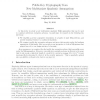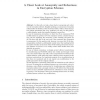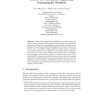135
click to vote
PKC
2012
Springer
13 years 4 months ago
2012
Springer
In this work, we study a new multivariate quadratic (MQ) assumption that can be used to construct public-key encryption schemes. In particular, we research in the following two di...
147
click to vote
IACR
2011
14 years 1 months ago
2011
We consider the question of how to store a value secretly on devices that continually leak information about their internal state to an external attacker. If the secret value is s...
135
click to vote
IACR
2011
14 years 1 months ago
2011
At PKC 2010 Smart and Vercauteren presented a variant of Gentry’s fully homomorphic public key encryption scheme and mentioned that the scheme could support SIMD style operations...
126
click to vote
CRYPTO
2010
Springer
14 years 10 months ago
2010
Springer
We present a general method to compile any cryptographic algorithm into one which resists side channel attacks of the only computation leaks information variety for an unbounded nu...
116
click to vote
CANS
2010
Springer
15 years 1 days ago
2010
Springer
Abstract. Predicate encryption is a new powerful cryptographic primitive which allows for fine-grained access control for encrypted data: the owner of the secret key can release pa...
127
click to vote
ASIACRYPT
2010
Springer
15 years 1 days ago
2010
Springer
Abstract. In this work, we take a closer look at anonymity and robustness in encryption schemes. Roughly speaking, an anonymous encryption scheme hides the identity of the secret-k...
119
click to vote
WOTE
2010
15 years 11 days ago
2010
We present a K-out-of-L voting scheme, i.e., a voting scheme that allows every voter to vote for (up to) K candidates from a set of L candidates. The scheme is receipt-free, which ...
114
click to vote
JCS
2010
15 years 14 days ago
2010
Protocol authentication properties are generally trace-based, meaning that authentication holds for the protocol if authentication holds for individual traces (runs of the protoco...
124
click to vote
INFORMATICALT
2006
15 years 2 months ago
2006
A convertible authenticated encryption scheme allows a specified recipient to recover and verify a message simultaneously. Moreover the recipient can prove the dishonesty of the se...
122
click to vote
IJISEC
2006
15 years 2 months ago
2006
Since Boneh and Franklin published their seminal paper on identity based encryption (IBE) using the Weil pairing , there has been a great deal of interest in cryptographic primitiv...



